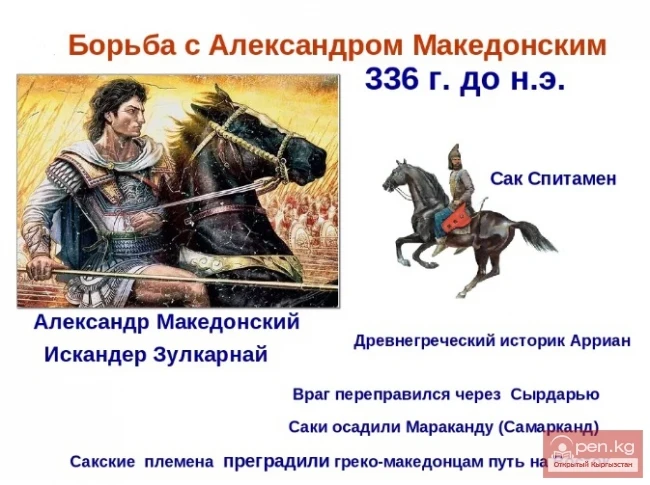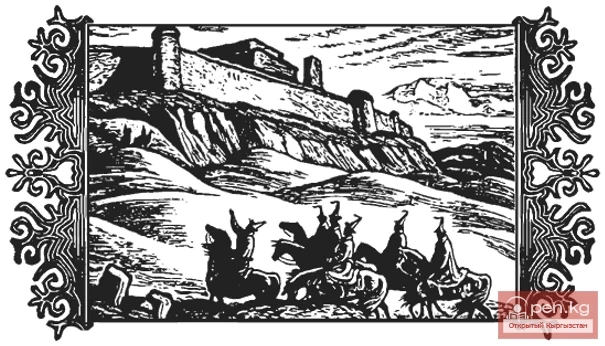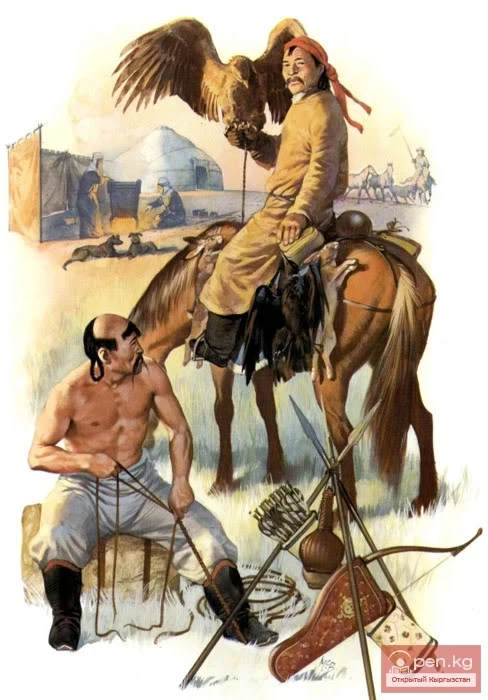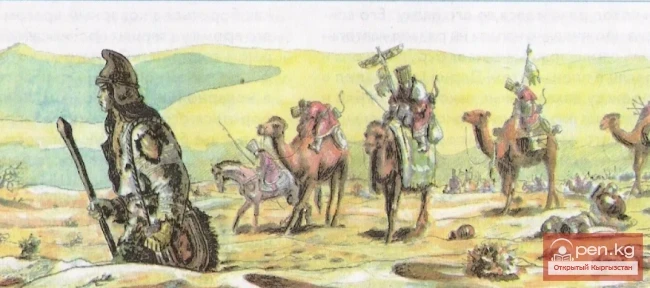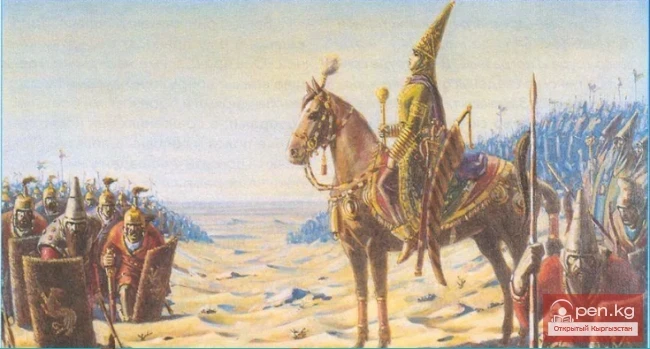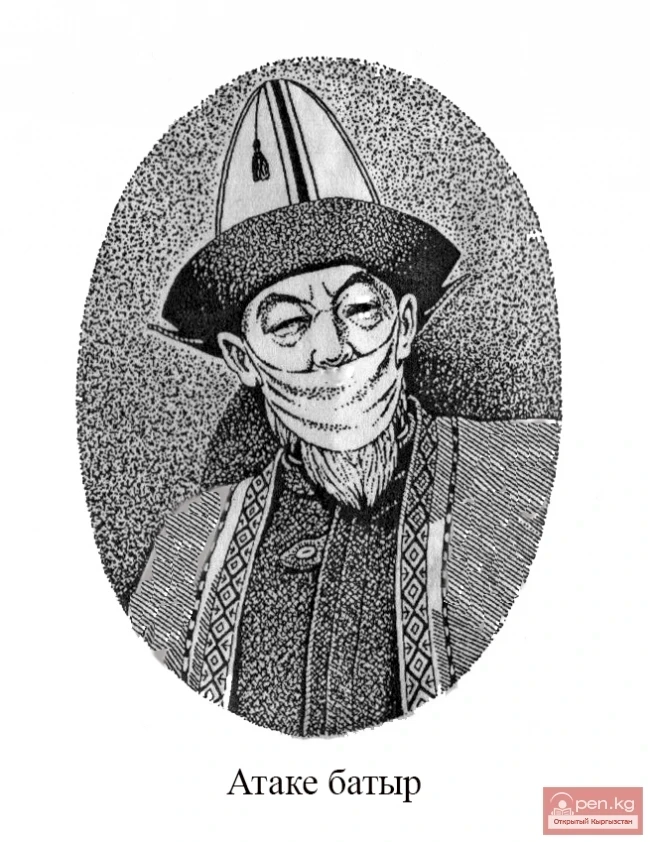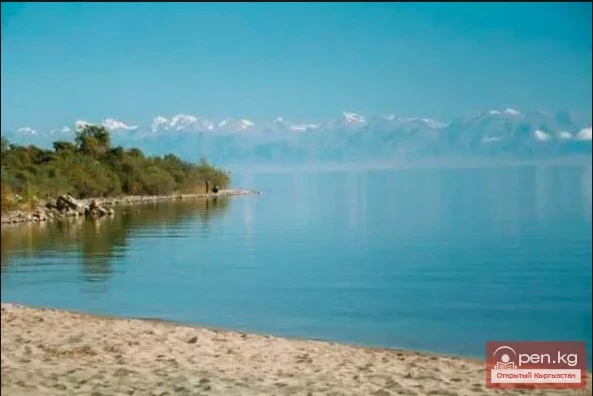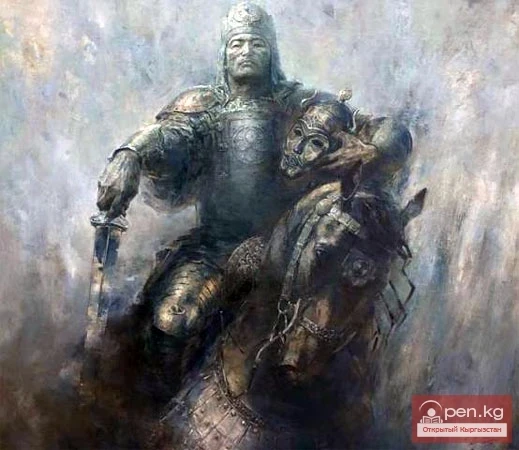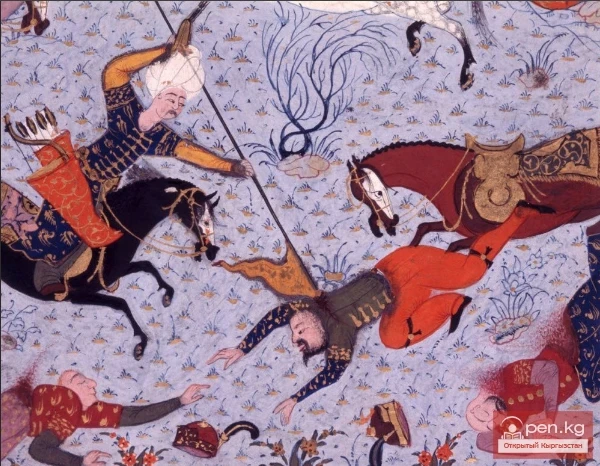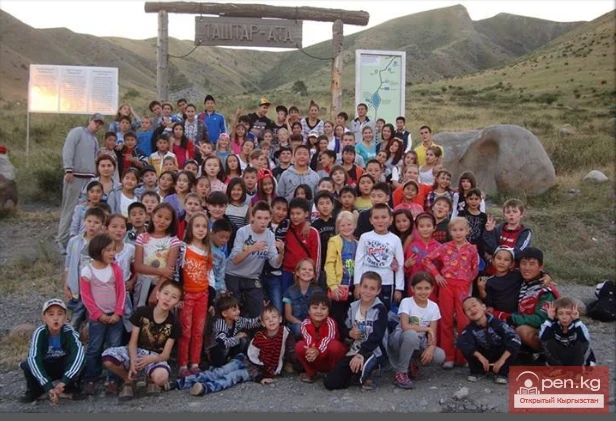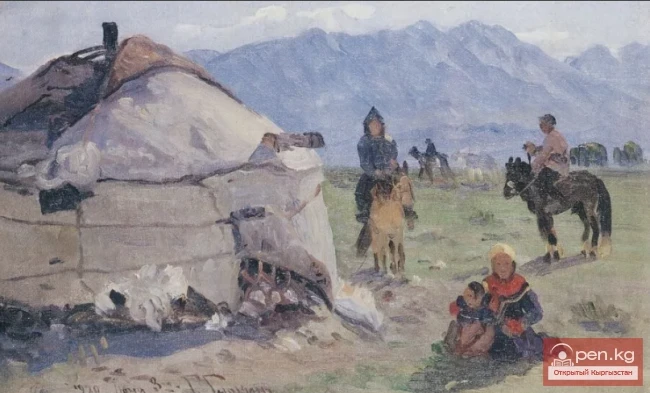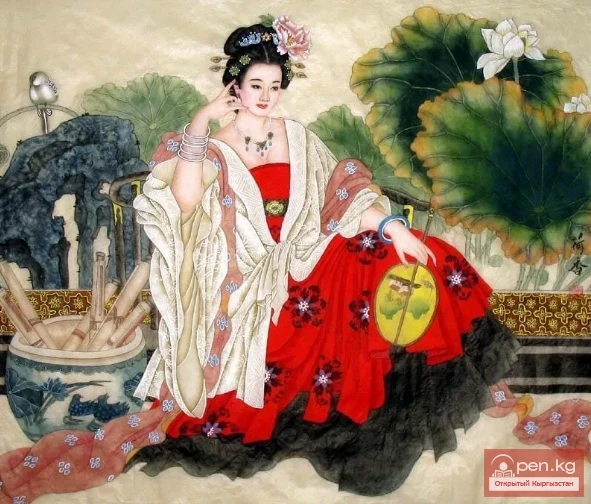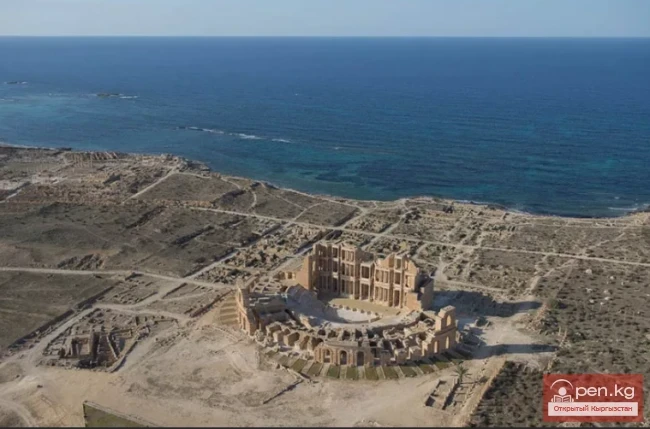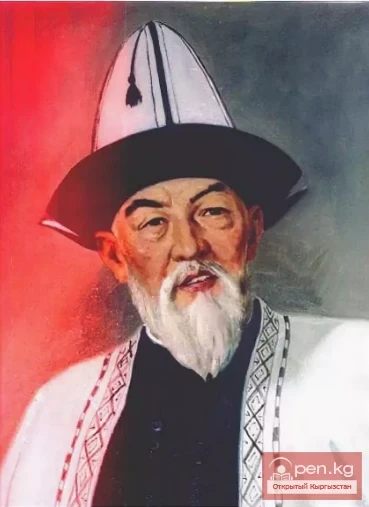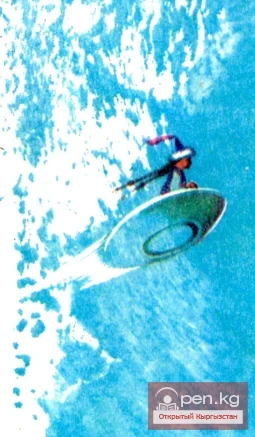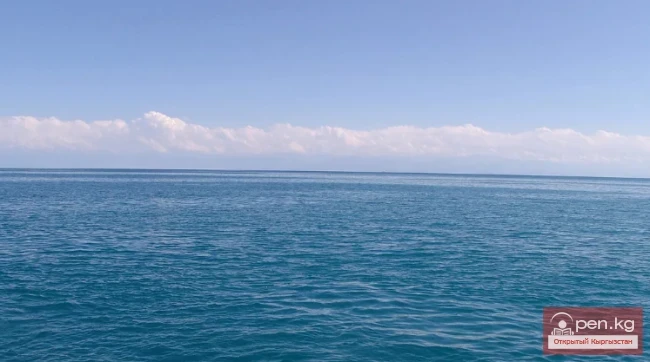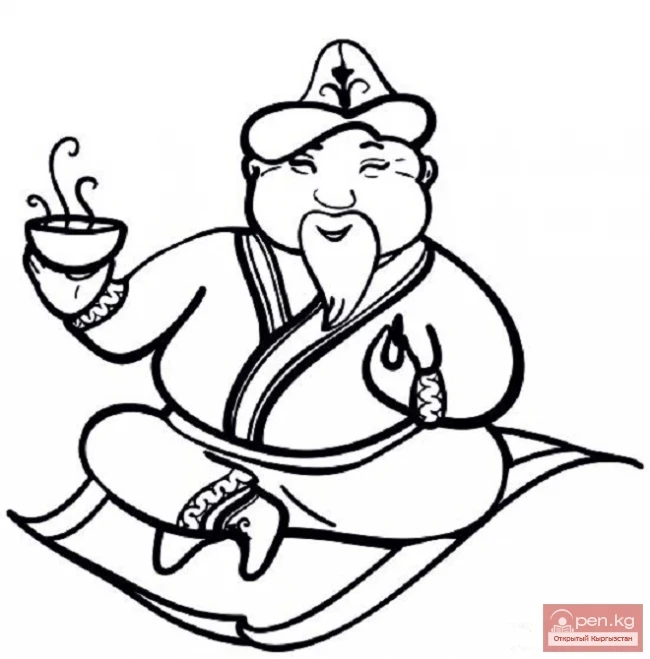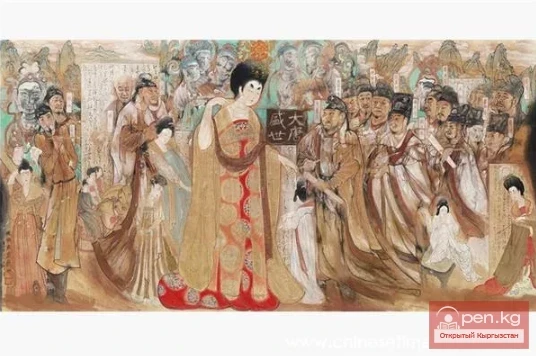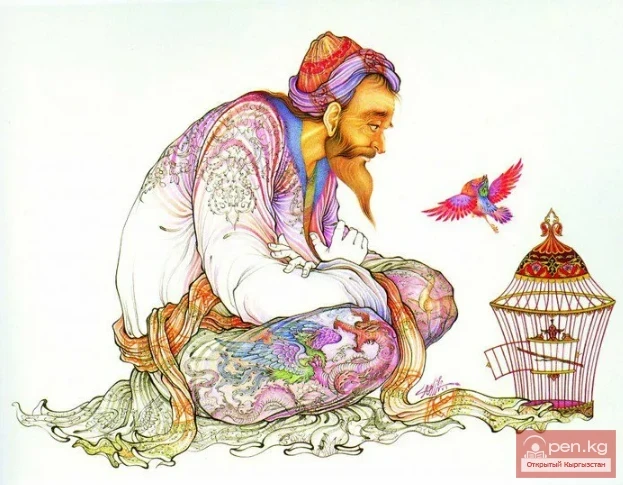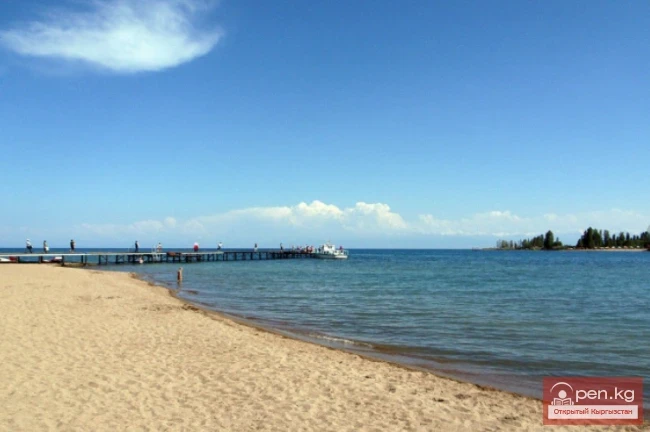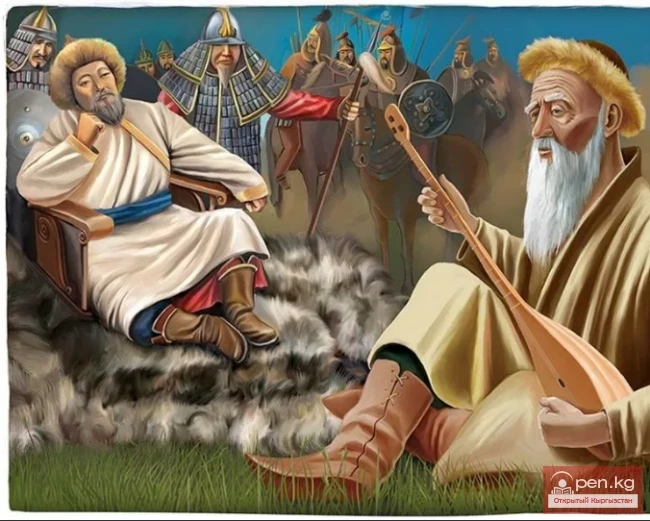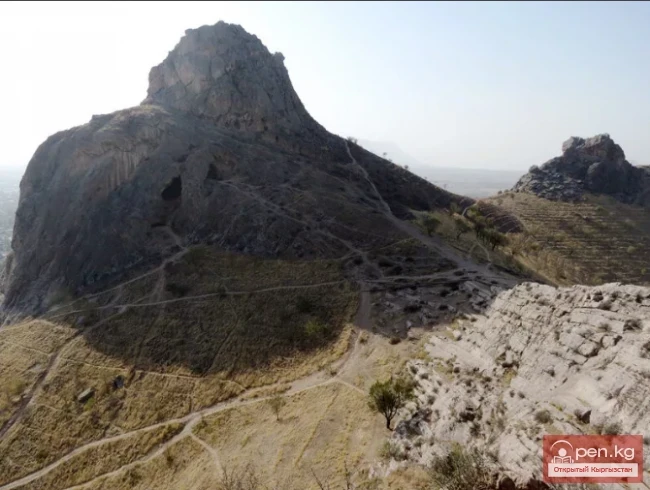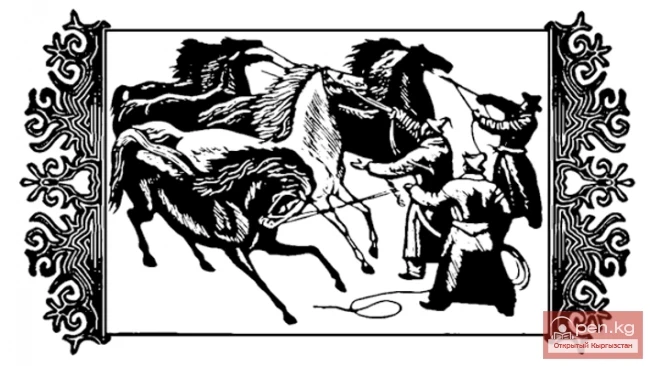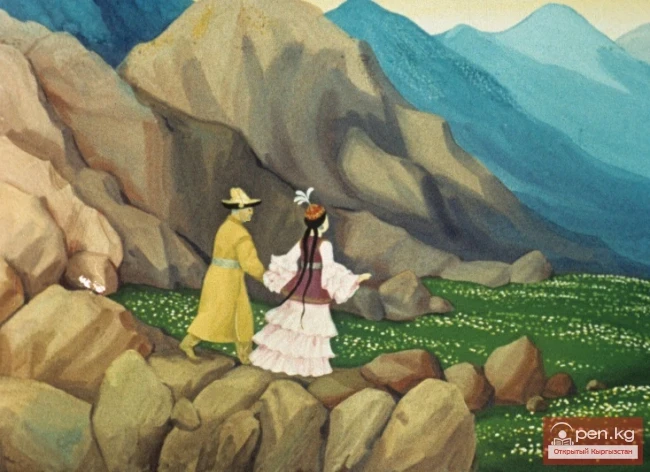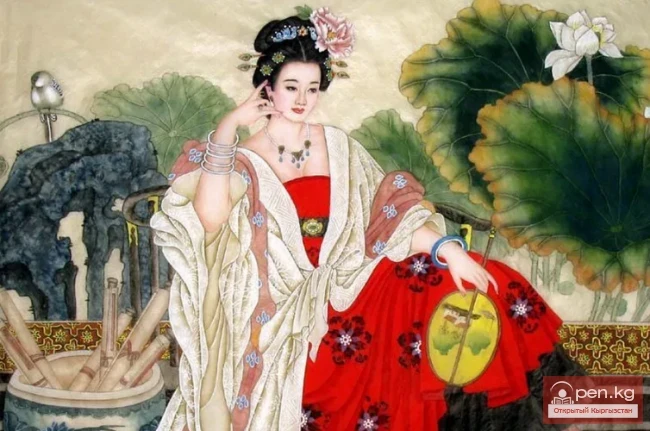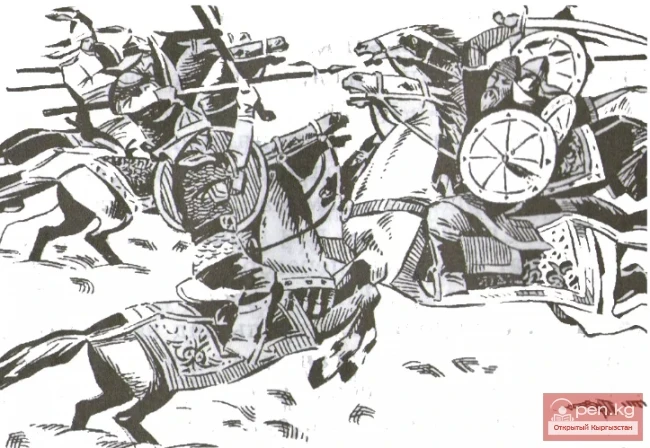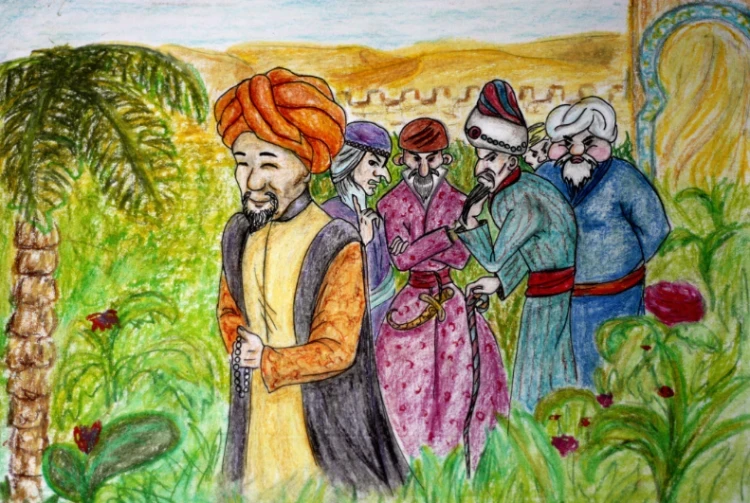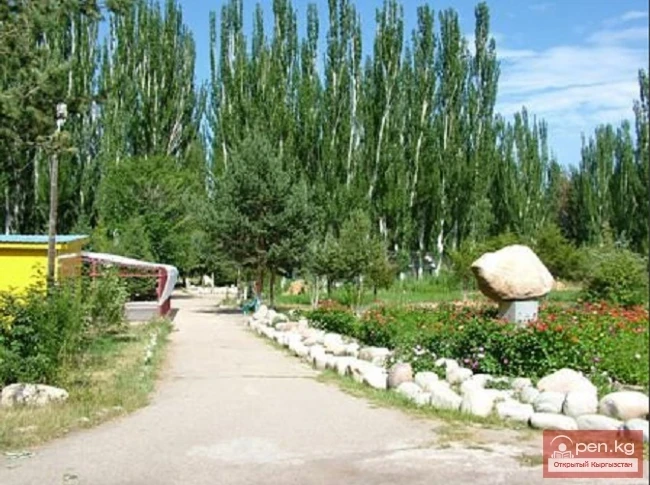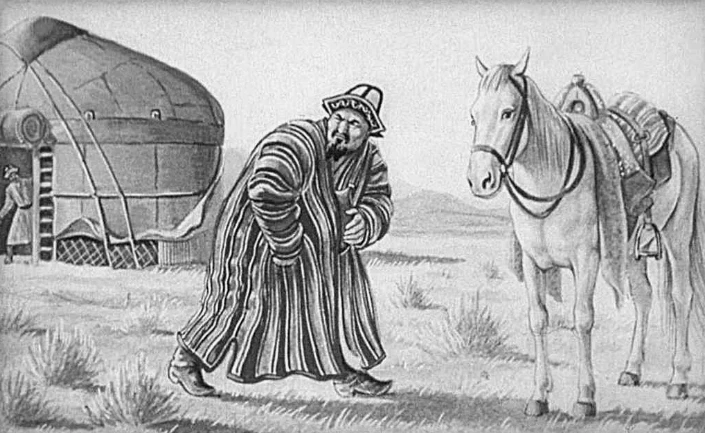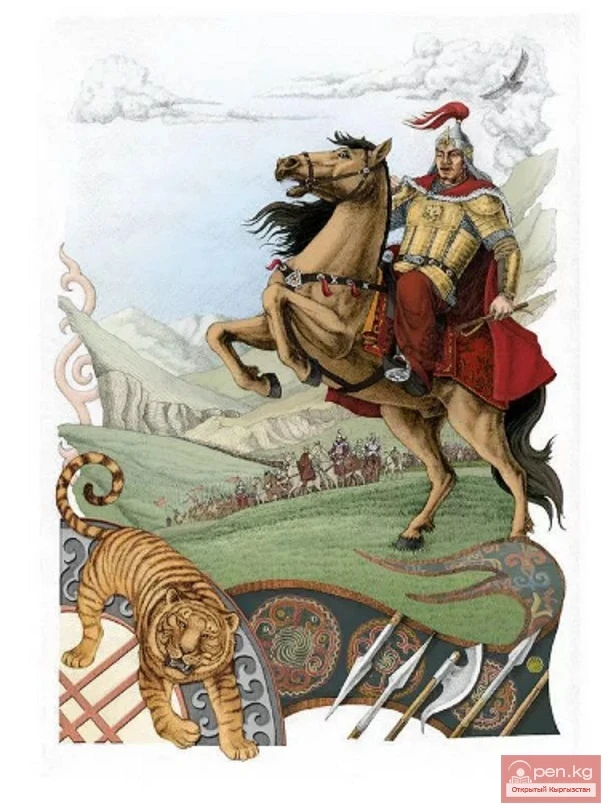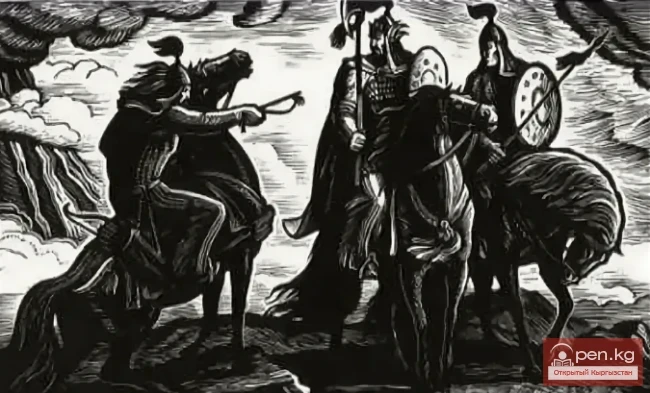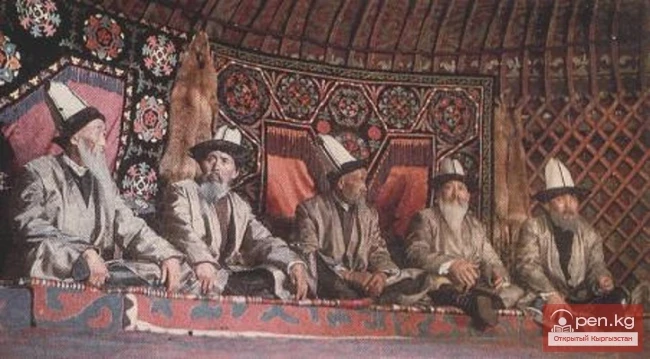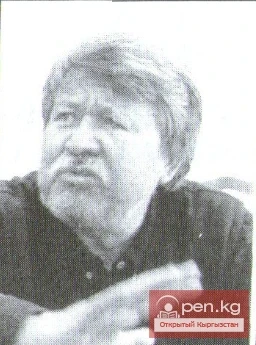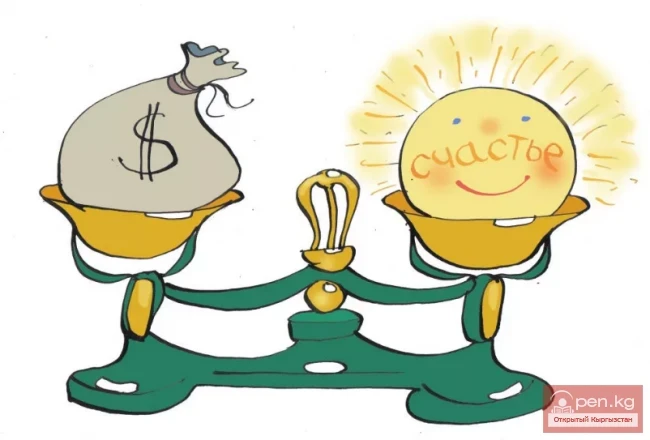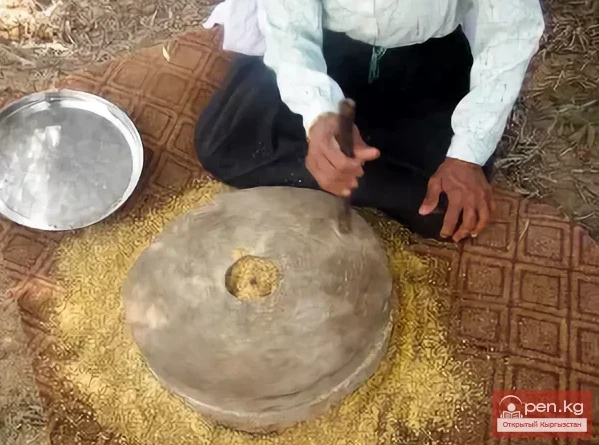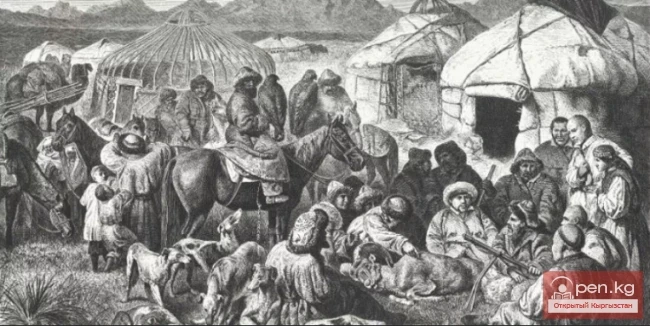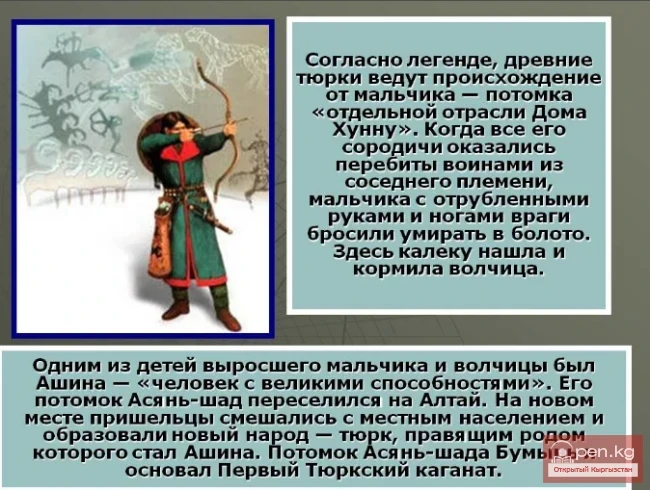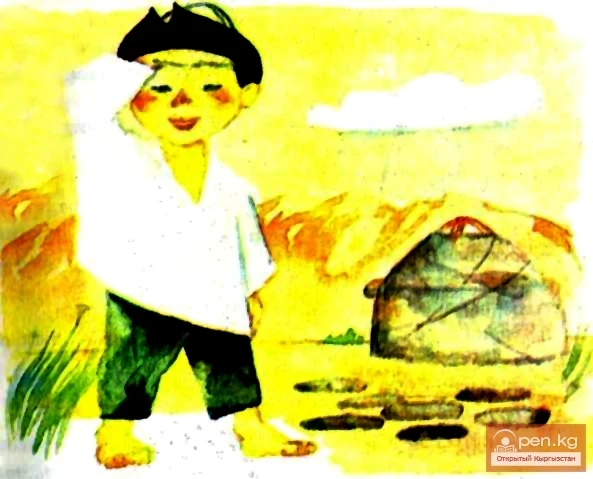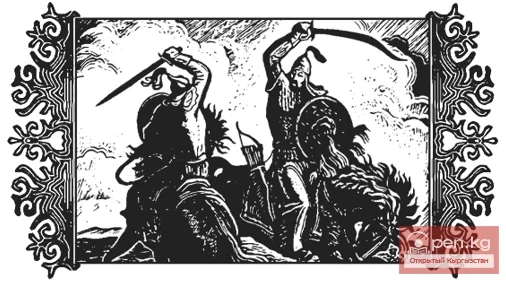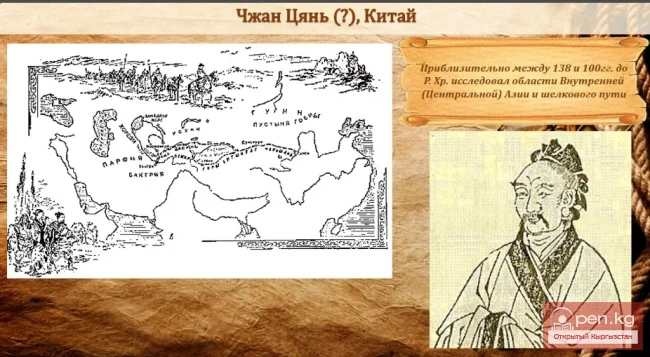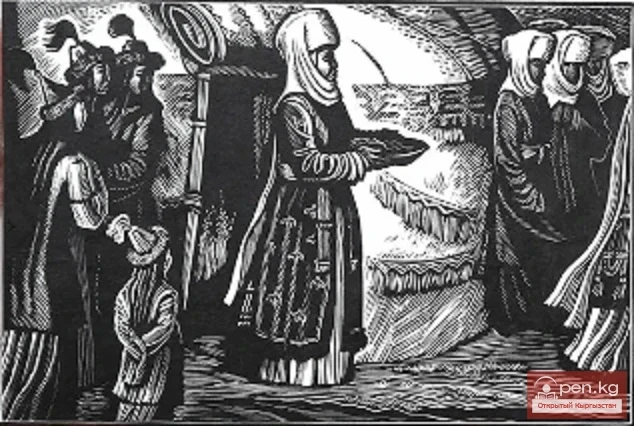RECEPTION OF SCYTHIAN AMBASSADORS BY ALEXANDER THE GREAT
The morning appointed by Alexander for the crossing had arrived.
In the midst of preparations, a rumor spread that Scythian ambassadors had arrived from the other shore. Warriors gathered from all around to watch as two dozen barbarians in simple clothing rode through the camp, accompanied by Ptolemy's warriors. They were unarmed. Their faces were grim.
They dismounted at the royal tent. Shortly thereafter, Ptolemy invited the senior members of the embassy to the reception.
Alexander, just risen from his bed, sat on the throne and curiously stared at the newcomers. The chief ambassador, a tall old man with a white beard, silently fixed an assessing gaze on the king from beneath his bushy eyebrows.
The second, a wiry, lean warrior, also did not take his eyes off the Macedonian.
The king impatiently ordered the translator to ask what the ambassadors had come for. He was still weak from his injury, suffering from pain in the back of his head.
His face was pale, and beads of sweat dotted his high forehead.
The old man spoke:
— If the gods had wanted to make the size of your body equal to your greed, you would not fit on all the earth. With one hand, you would touch the east, with the other — the west, and your crown would rest on the source of divine light.
You have swallowed so much land that you will not be able to digest it. And if you succeed in conquering all of humankind, you will surely wage war against forests, snows, rivers, and wild animals. Such is, it seems, your nature! But do you not know that great trees grow slowly, while they can be uprooted in an hour? Even a lion once served as food for tiny birds. And rust eats iron. Nothing is so strong that it would not be threatened by danger, even from a weak creature...
The generals and friends present in the tent listened silently to the Scythian's speech. The king, leaning back against the throne, gripped the armrest so tightly that the knuckles turned white.
The Scythian continued:
— Where does our enmity come from? We have never set foot on your land. We have enough of our own land. We have served no one and do not wish to command. Freedom and peace with neighbors — that is what we strive for.
Ptolemy leaned toward the king's ear:
— Shall I order to seize these insolent men? Alexander stubbornly shook his head and stared again at the Scythian, who continued:
...Know this, we Scythians have been given such gifts from heaven: a yoke of oxen, a plow, a spear, an arrow, and a cup. We use these in communication with friends and against enemies. The fruits obtained through the labor of oxen we present to friends, and from the cup, we pour drinks to the gods together with them; with the arrow, we strike enemies from afar, and with the spear — up close. Many kings have come to us with war, but not all have left on their feet. You boast that you have come here to pursue robbers, while you yourself rob the tribes you reach. Why do you need wealth? It only incites greater hunger. You will be the first to suffer from satiety: the more you have, the more greedily you strive for what you do not possess. Did not countless treasures of the Persian kings fall to you? And now you stretch out your insatiable hands toward our herds...
— You are the first to insult me! - interrupted Alexander. Are not your warriors galloping on that shore, shouting and making faces like monkeys?
But it is not we, but you who have come to our borders! It is not we, but you who have prepared boats and rafts for the crossing into our lands! But cross only the Jaxartes, and you will know the breadth of our expanses. You will never catch the Scythians. Our poverty will be faster than your army, laden with plunder taken from so many peoples...
In other words, you plan to flee like hares! - Alexander scoffed. - Yet I have heard that the Scythians are the bravest of men!
The old Scythian hesitated for a moment but then retorted:
— Next time, thinking we are far away, you will see us in your camp... We pursue and flee with equal speed. So hold on tightly to your fate. Put a bridle on your fortune: it will be easier to manage. We say that fortune has no legs, only hands and wings: stretching out its hands, it does not allow itself to be grasped, just as it does not allow itself to be caught by its wings. And if, as rumor has it, you are a god, you yourself should bestow blessings upon mortals, not take their goods away. But if you are a man, remember that you will always remain one...
Silence ensued. Alexander rose from the throne and asked:
— Have you said all you wanted, Scythian sage?
The old man slightly bowed his gray head, hesitated a bit, and said:
— I will say one last thing: with whom you do not fight, you can find faithful friends. The strongest friendship occurs between equals, and only those who do not threaten each other with force are considered equals.
Alexander replied:
— I have listened to your speech and thank you for your advice. I will use both my fortune and your wisdom and will not act recklessly and boldly. I will do as my fate commands me. Ptolemy! See the ambassadors to the bank of the Tanais, and let them return safely to their own land.
When the ambassadors left, chiliarch1 Craterus asked:
— What have you decided, basileus2?
— What? Did you not know my decision three days ago?
— So...
— Begin the crossing at once!3
1 Chiliarch - commander of the guard, the highest position in the state of Alexander the Great.
2 Basileus - king, emperor.
3 The troops of Alexander the Great crossed the Jaxartes (Syr Darya) in 329 BC in the area of modern Khujand in Tajikistan.
THE BATTLE OF ALEXANDER THE GREAT WITH THE SCYTHIANS
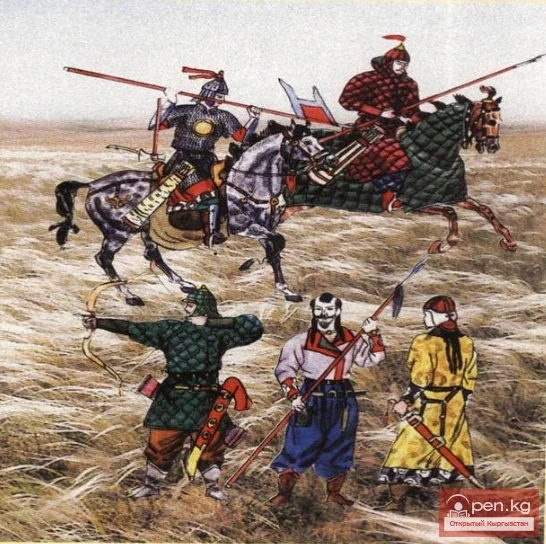
The Macedonian camp was set in motion. According to orders, the phalangites1 boarded the rafts, occupying the bow sections.
— Kneel! Lock shields!
A solid wall of shields was formed, over which protruded the crested helmets and sarissas2. Behind such protection, siege engines were set up. The phalangites also shielded them from the sides. The other warriors were rowers. The same order was maintained on the rafts with the cavalry. The horses were to swim behind the rafts on their own. Light infantry lined up at the water's edge, holding in their hands the already tested skins filled with straw from the Oxus3.
The Scythians, noticing the enemy's preparations, raised a furious uproar. Clouds of arrows soared into the sky, but most fell into the water.
Alexander appeared. He was fully armed, and the warriors erupted in jubilant cries: the king himself leads them into battle, which means victory!
On a bay horse (Bucephalus was reserved only for parades), Alexander rode along the shore, checking that everything was done properly, encouraging the soldiers in a barely audible hoarse voice:
— Although the Scythians are known to be the bravest warriors, two centuries ago they were defeated by Darius Hystaspes, the father of that same Xerxes4. Should we fear them?
— Lead on! — the warriors shouted enthusiastically.
Looking at the raging horsemen on the other side, Alexander addressed the soldiers operating the siege engines:
— Now, scare them properly!
Arrows the size of spears, with a tight whistling sound, soared over the river. A huge horseman, prancing on a powerful horse at the very edge of the opposite shore, raised his arms and fell into the water.
It was evident that the Scythians were momentarily stunned. Then chaos ensued. With shrieks and cries, the horsemen withdrew from the riverbank. Undoubtedly, they were struck by the range of the monstrous arrow and its lethal force: it pierced the shield, armor, body of the hero, and exited between the shoulder blades!
Taking advantage of the enemies' confusion, the king raised his hand. Immediately, the battle trumpets sounded. Alexander was the first to untie the raft, jumped onto it, and, kneeling, joined the ranks of the phalangites.
The crossing began...
It began, but the Jaxartes was still not finished — a swift river, and the rafts swayed on its waters like eggshells. They began to drift away, despite the desperate efforts of the rowers. Moreover, the warriors, accustomed to feeling solid ground beneath their feet, now rose and fell with the rafts, freezing, clutching onto each other, fearing to fall into the swift current — in heavy armor, this would mean immediate and disgraceful death. Even clinging to the rowers, thereby slowing down the movement, Alexander saw all this but could do nothing. Even to encourage them with words — his sore throat deprived him of his voice. And the Scythians, recovering from their confusion, again clustered at the very edge of the water. A solid wall of horse heads, helmets, shouting mouths, and dull reflections of akinaks5...
The Macedonians were saved by the siege engines. Again and again, they launched darts into the thick ranks of the barbarians, and almost every shot hit the target. And the closer the rafts approached, the more terrible the damage inflicted by the machines became. The Scythians were forced to retreat once more.
According to orders, the lightly armed troops were the first to secure the shore: Parthian archers, Agrianians, peltasts6, and dart throwers.
They quickly took positions and unleashed a storm of arrows, stones, and darts upon the enemy. Under their cover, the heavy infantry began to disembark. Behind them, the cavalry followed. Seeing this, the Scythians attempted to crush the front ranks of the enemy and topple them into the river. Alexander sent against them a hyparchy of Asians and four ilas7 of infantry. The nomads surrounded them on all sides, showered them with arrows, and immediately galloped away, only to return. This happened several times: the barbarians struck the Greeks and Macedonians from afar, without engaging in hand-to-hand combat. Evidently, the threat of the Scythian ambassador was being realized.
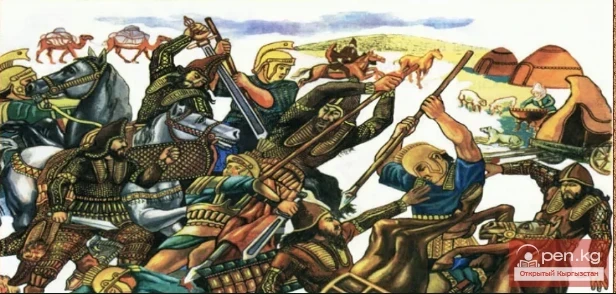
Then Alexander ordered Balacrus, the commander of the light infantry, to introduce his peltasts, archers, and Agrianians among the ranks of the horsemen. And when the wave of nomads approached once again, they were met not by the defenseless hoplites8 against enemy arrows, but by cavalrymen. At the same time, three hyparchies of hetairoi ("friends") and all mounted dart throwers struck. Alexander himself, having formed the heavy cavalry into deep columns, led it to the right flank where the main forces of the Scythians were located - their armored cavalry.
The Roman historian Curtius Rufus wrote:
“The king compensated for the lack of strength of his still weak body with firmness of spirit. His voice, encouraging the warriors, was not heard, as his wound on the neck had not yet fully closed; however, everyone saw how he participated in the battle... Encouraging each other and not caring for their lives, they began to press upon the enemy...
The center of the Scythian army, where the commoners stood, advanced slowly, step by step. Against them acted the dart throwers and archers of Balacrus, as well as the light cavalry of the Macedonians. The forces were approximately equal. Satrap fought in the front ranks. His shield was pierced by enemy arrows; he threw it away and replaced it with the shield of a slain Macedonian.
— Be braver, brothers! — he shouted fiercely, trying to outshout the noise of battle. — Just a little more, and we will throw them into the river!
Around him, his friends and neighbors fell. However, the warriors of Alexander9 fell too. Many of them fell back, having received serious wounds: the Scythians were not without reason considered the finest archers in the world.
But the right flank — the royal and princely retinues, forming the main core of the Scythian army — could not withstand the swift attack of the heavy Macedonian cavalry led by the king himself and began to retreat more and more hastily. Several noble leaders were killed. The leader of the nobility, Kartazis, was wounded twice by a spear.
Under Spargathis, the horse fell, and the prince switched to a spare one...
The Macedonian pressure increased. The armored cavalry that broke ahead began to outflank the Scythian army...
And then the retreat of the retinues turned into a rout. Kartazis, who was wounded for the third time, was forced to let his horse gallop — otherwise, he faced disgraceful captivity...
...Some broad-shouldered young warrior-hero in a shaggy helmet and shining armor stubbornly raced after Spargathis, holding a spear at the ready. The prince of Zarichensk wanted to knock him off his horse with an arrow, turning back halfway. But the attempt was in vain: his thick belly prevented him from turning back, and the arrows flew past. The horse under the heavy prince began to wheeze, its pace slowed. And the shaggy Yavana10 was approaching. His eyes sparkled with blue flames, it seemed that arrows were also shooting from them. Closer... closer... The Yavana raised his hand with the spear and pulled it back, preparing to strike the fleeing man in the back. Spargathis had long lost his shield and was now defenseless from behind.
— Yai, yai! — he cried in despair. But then the horse suddenly stumbled and buried its nose in the ground. The fat prince, as if shot from a catapult, flew out of the saddle and crashed onto the stony ground.
From the impact, he lost consciousness and no longer saw how the fearsome Yavana with the raised spear flew past...
— Satrap-pitar11 — shouted the young militiaman. — We are being outflanked! What to do?
— Fight! — replied Satrap, he himself already saw that the battle was lost. He tried to pull his troops out of the line of fire. Too late!
Surrounded on three sides, the militia faltered and began to retreat in disorder. Then they ran just like the retinues of the princes.
Satrap was swept away by the general current. He tried several times to turn back. Finally, he succeeded. With a strong blow of his long sword, he knocked down a charging Macedonian, but he himself received a serious wound in the side. For several more minutes, the son of Kidreus was seen fending off the Macedonians pressing upon him...
The Greek historian Arrian wrote:
“About a thousand of them (the Scythians) fell, including one of the leaders, Satrap, and about one hundred and fifty were taken captive. The enemy was pursued swiftly, and the warriors suffered from severe thirst. The entire army endured thirst, and Alexander himself drank water on the run, whatever was available. But the water was bad, and he began to suffer from severe distress... He was carried back to the camp in an extremely serious condition.”
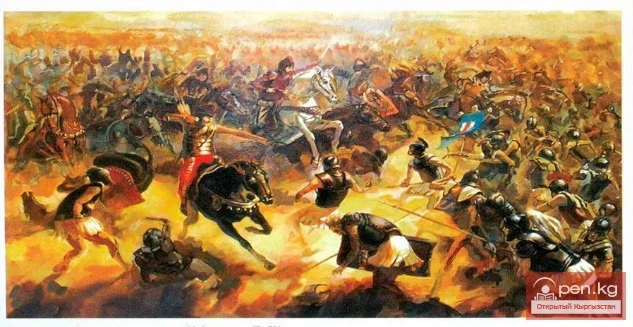
Arrian, a superstitious man, added: “Thus, the prophecy of Aristander was fulfilled.”
Another ancient author noted: “The Scythians fled into the salt marsh steppes, and the Macedonians chased them for a full 80-100 stadia (15-18 km). And only the coming night forced them to cease the pursuit...”.
Thus, Alexander achieved another difficult victory. This is evidenced by the losses of the Macedonians: sixty horsemen and one hundred infantry were killed, and one thousand were wounded. And in the largest battle at Gaugamela, which decided the fate of the Persian empire, these losses amounted to only one hundred men.
The next day, all the captured Scythians brought to the royal tent were released by order of Alexander himself. He himself came out to them and gave a brief speech:
— I competed with you in bravery, not in rage. Return to your land and tell your leaders: I have nothing to divide with the Scythians. But I forbid you to cross the Tanais!
The Scythians listened, as is customary, thanked the king, and set off on their way. Prince Spargathis looked back at the royal tent for a long time. In King Alexander, he recognized the fierce Yavana who had almost killed him in battle.
Alexander attached great importance to the battle on the Jaxartes (Syr Darya). The glory of the invincibility of the Scythians was firmly established in the world of that time. The population of Asia especially believed in this. And the current battle proved that no nation, even with the loudest martial authority, can withstand Macedonian arms.
From now on, Alexander was confident that Sogdiana was conquered, his hands were untied, and he could realize the long-held dream, until now carefully concealed from his own army - to move into India...
Comments:
1 Phalangites - closely packed ranks of heavy infantry.
2 Sarissas - long spears reaching 6 m. Sarissophoroi - heavy Macedonian infantry armed with sarissas.
3 Oxus - Amu Darya river.
4 Xerxes - Persian king who led the invasion of Greece in 480-479 BC.
5 Akinak - short sword.
6 Peltasts - lightly armed infantry, equipped with leather shields, long swords, throwing spears, and long darts.
7 Ila - a cavalry unit in the Macedonian army, about 300 horsemen. Later renamed to hyparchy.
8 Hoplites - heavily armed foot soldiers in the city-state militia. Hoplites fought in closed phalanxes, with the main weapons being spear and sword. They also had large shields, helmets, armor, and greaves.
9 Iskander - this is how the Scythians referred to Alexander the Great.
10 Yavana - this is how the Greeks were referred to in the East.
11 Pitar - commander.
Legends
